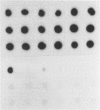Abstract
The aims of this study were to assess the prevalence and type of activating point mutations at codons 12, 13, and 61 of the Ki-, Ha-, and N-ras genes in a series of early gastric carcinomas in white patients and to correlate these ras gene mutations, if any, with the histological type (Lauren classification), the type of growth pattern, and with the Helicobacter pylori status. Haematoxylin and eosin and Giemsa stained sections from 45 formalin fixed, paraffin wax embedded early gastric carcinomas were used to assess the Lauren type, the type of growth pattern, and the antral H pylori status. DNA was extracted according to standard procedures. Mutations at codon 12 of the Ki-ras gene were examined with a polymerase chain reaction based restriction fragment length polymorphism (PCR-RFLP) method and dot blot hybridisation with allele-specific 32P-labelled oligodeoxynucleotide (ASO) probes. All other ras genes were analysed with specific PCR amplification and dot blot hybridisation with ASO probes. Mutations were detected by overnight autoradiography at -70 degrees C. Some 20 intestinal-type and 25 diffuse-type early gastric carcinomas were seen. According to growth pattern, there were 24 small mucosal type early gastric carcinomas, five superficial spreading type early gastric carcinomas, and 16 penetrating type early gastric carcinomas (four penetrating A type, 12 penetrating B type). H pylori was found in the antral mucosa of 28 early gastric carcinomas (62%). Activating ras gene mutations were not found. It was discovered that activating point mutations at codons 12, 13, and 61 of the Ki-, Ha-, and N-ras genes do not play a part in the development of early gastric carcinomas in white subjects, irrespective of Lauren type. Moreover, differences in biological behaviour between early carcinomas with different types of growth pattern are not related to these ras gene mutations. Finally, H pylori positive and H pylori negative gastric carcinomas cannot be discriminated on the basis of ras gene mutational analysis.
Full text
PDF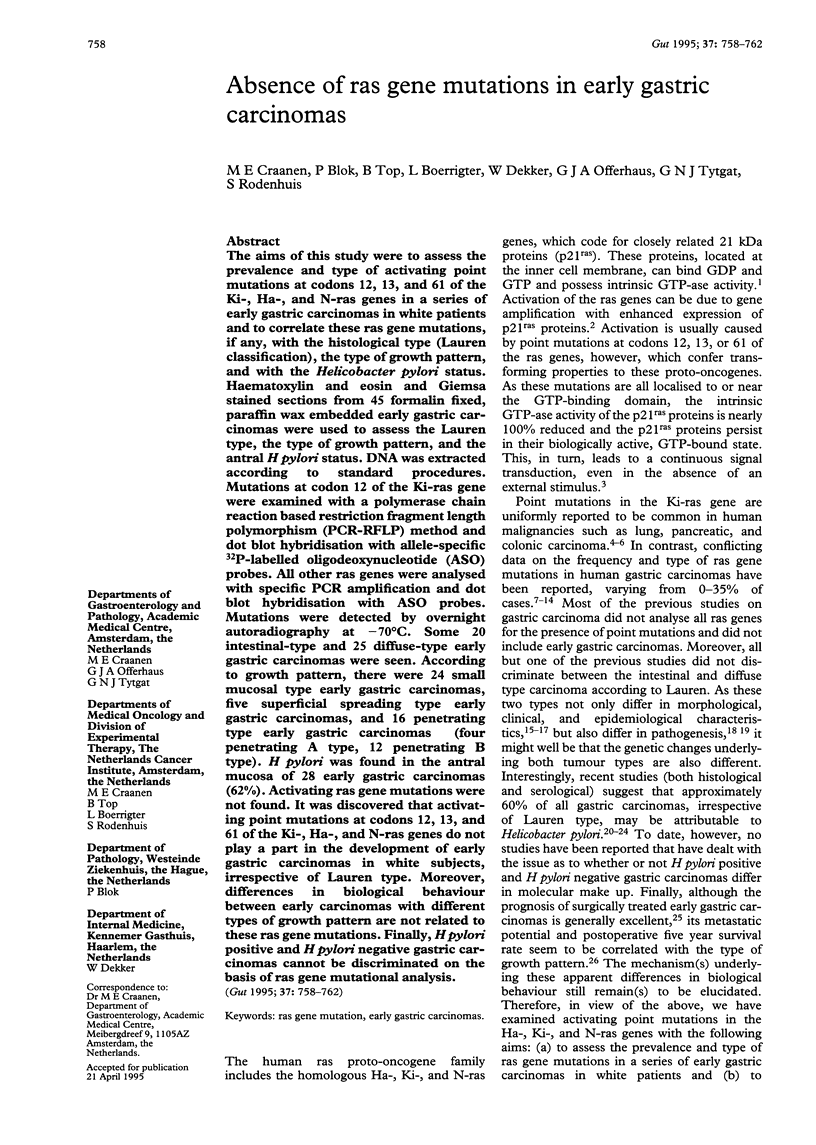
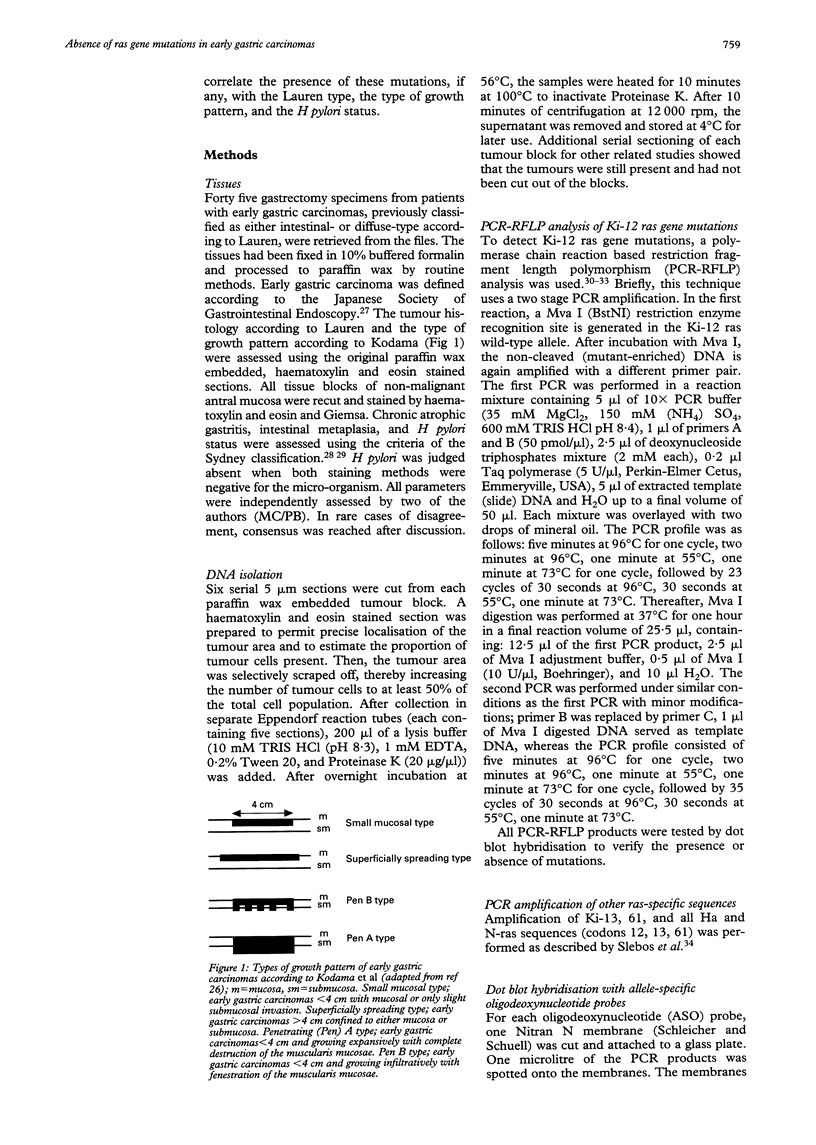
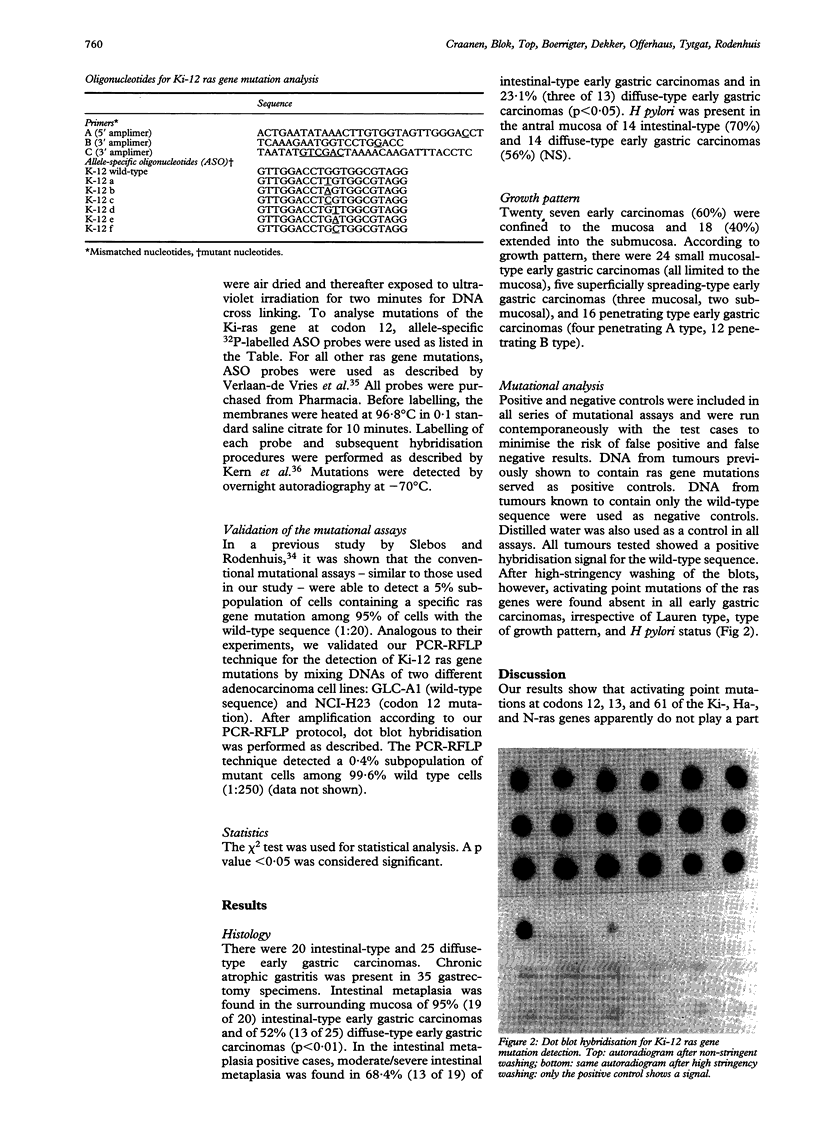
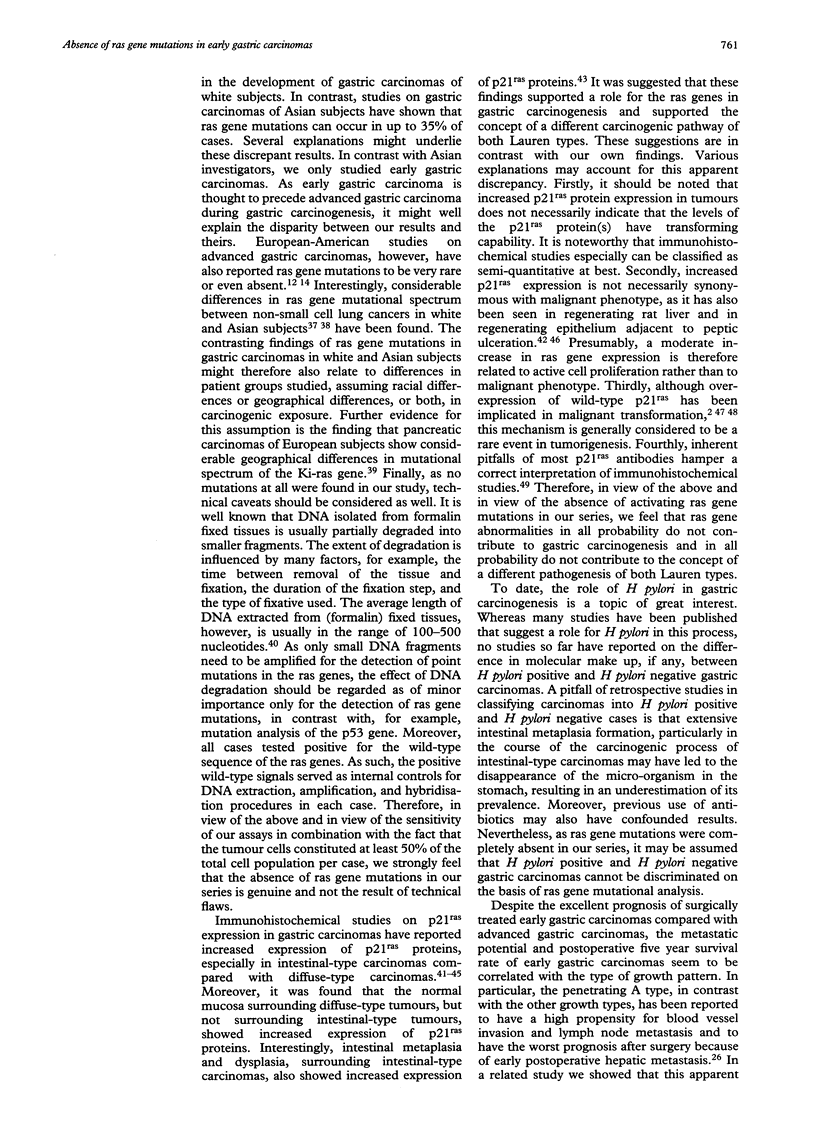
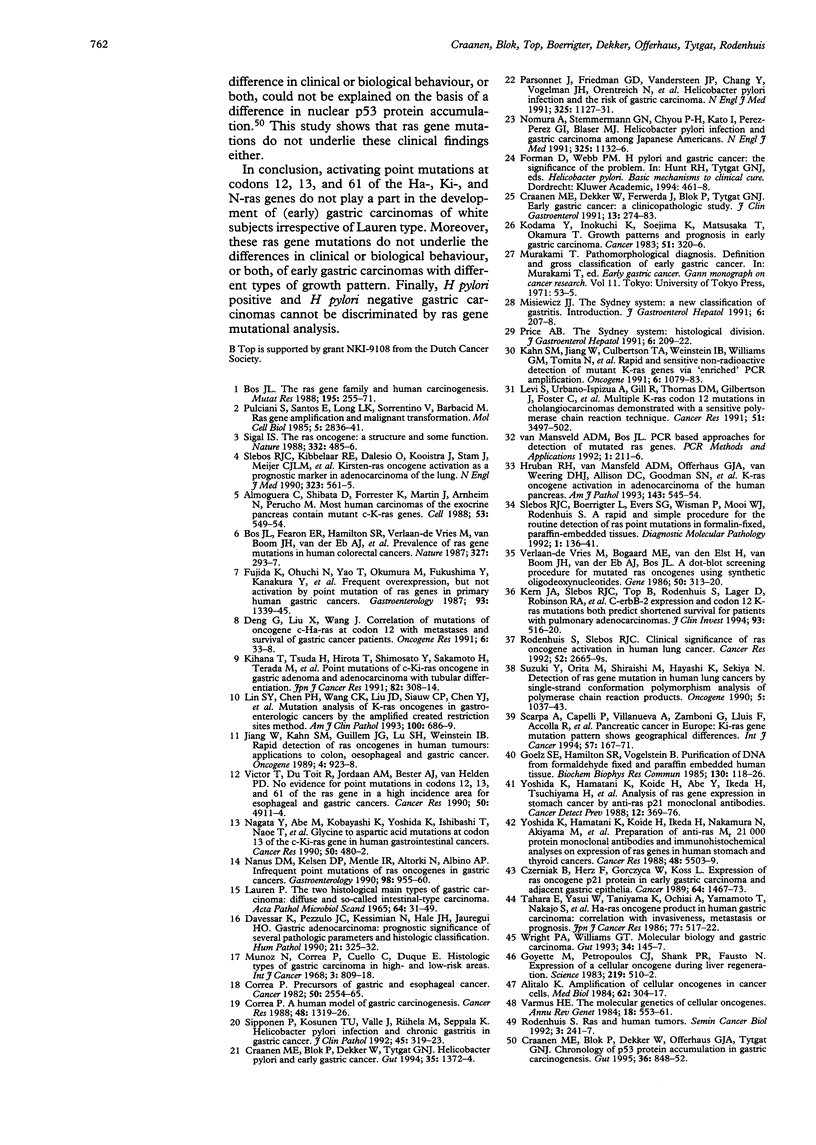
Images in this article
Selected References
These references are in PubMed. This may not be the complete list of references from this article.
- Alitalo K. Amplification of cellular oncogenes in cancer cells. Med Biol. 1984;62(6):304–317. [PubMed] [Google Scholar]
- Almoguera C., Shibata D., Forrester K., Martin J., Arnheim N., Perucho M. Most human carcinomas of the exocrine pancreas contain mutant c-K-ras genes. Cell. 1988 May 20;53(4):549–554. doi: 10.1016/0092-8674(88)90571-5. [DOI] [PubMed] [Google Scholar]
- Bos J. L., Fearon E. R., Hamilton S. R., Verlaan-de Vries M., van Boom J. H., van der Eb A. J., Vogelstein B. Prevalence of ras gene mutations in human colorectal cancers. 1987 May 28-Jun 3Nature. 327(6120):293–297. doi: 10.1038/327293a0. [DOI] [PubMed] [Google Scholar]
- Bos J. L. The ras gene family and human carcinogenesis. Mutat Res. 1988 May;195(3):255–271. doi: 10.1016/0165-1110(88)90004-8. [DOI] [PubMed] [Google Scholar]
- Correa P. Precursors of gastric and esophageal cancer. Cancer. 1982 Dec 1;50(11 Suppl):2554–2565. [PubMed] [Google Scholar]
- Craanen M. E., Blok P., Dekker W., Offerhaus G. J., Tytgat G. N. Chronology of p53 protein accumulation in gastric carcinogenesis. Gut. 1995 Jun;36(6):848–852. doi: 10.1136/gut.36.6.848. [DOI] [PMC free article] [PubMed] [Google Scholar]
- Craanen M. E., Blok P., Dekker W., Tytgat G. N. Helicobacter pylori and early gastric cancer. Gut. 1994 Oct;35(10):1372–1374. doi: 10.1136/gut.35.10.1372. [DOI] [PMC free article] [PubMed] [Google Scholar]
- Craanen M. E., Dekker W., Ferwerda J., Blok P., Tytgat G. N. Early gastric cancer: a clinicopathologic study. J Clin Gastroenterol. 1991 Jun;13(3):274–283. doi: 10.1097/00004836-199106000-00006. [DOI] [PubMed] [Google Scholar]
- Czerniak B., Herz F., Gorczyca W., Koss L. G. Expression of ras oncogene p21 protein in early gastric carcinoma and adjacent gastric epithelia. Cancer. 1989 Oct 1;64(7):1467–1473. doi: 10.1002/1097-0142(19891001)64:7<1467::aid-cncr2820640718>3.0.co;2-n. [DOI] [PubMed] [Google Scholar]
- Davessar K., Pezzullo J. C., Kessimian N., Hale J. H., Jauregui H. O. Gastric adenocarcinoma: prognostic significance of several pathologic parameters and histologic classifications. Hum Pathol. 1990 Mar;21(3):325–332. doi: 10.1016/0046-8177(90)90234-v. [DOI] [PubMed] [Google Scholar]
- Deng G. R., Liu X. H., Wang J. R. Correlation of mutations of oncogene C-Ha-ras at codon 12 with metastasis and survival of gastric cancer patients. Oncogene Res. 1991;6(1):33–38. [PubMed] [Google Scholar]
- Fujita K., Ohuchi N., Yao T., Okumura M., Fukushima Y., Kanakura Y., Kitamura Y., Fujita J. Frequent overexpression, but not activation by point mutation, of ras genes in primary human gastric cancers. Gastroenterology. 1987 Dec;93(6):1339–1345. doi: 10.1016/0016-5085(87)90264-2. [DOI] [PubMed] [Google Scholar]
- Goelz S. E., Hamilton S. R., Vogelstein B. Purification of DNA from formaldehyde fixed and paraffin embedded human tissue. Biochem Biophys Res Commun. 1985 Jul 16;130(1):118–126. doi: 10.1016/0006-291x(85)90390-0. [DOI] [PubMed] [Google Scholar]
- Hruban R. H., van Mansfeld A. D., Offerhaus G. J., van Weering D. H., Allison D. C., Goodman S. N., Kensler T. W., Bose K. K., Cameron J. L., Bos J. L. K-ras oncogene activation in adenocarcinoma of the human pancreas. A study of 82 carcinomas using a combination of mutant-enriched polymerase chain reaction analysis and allele-specific oligonucleotide hybridization. Am J Pathol. 1993 Aug;143(2):545–554. [PMC free article] [PubMed] [Google Scholar]
- Jiang W., Kahn S. M., Guillem J. G., Lu S. H., Weinstein I. B. Rapid detection of ras oncogenes in human tumors: applications to colon, esophageal, and gastric cancer. Oncogene. 1989 Jul;4(7):923–928. [PubMed] [Google Scholar]
- Kahn S. M., Jiang W., Culbertson T. A., Weinstein I. B., Williams G. M., Tomita N., Ronai Z. Rapid and sensitive nonradioactive detection of mutant K-ras genes via 'enriched' PCR amplification. Oncogene. 1991 Jun;6(6):1079–1083. [PubMed] [Google Scholar]
- Kern J. A., Slebos R. J., Top B., Rodenhuis S., Lager D., Robinson R. A., Weiner D., Schwartz D. A. C-erbB-2 expression and codon 12 K-ras mutations both predict shortened survival for patients with pulmonary adenocarcinomas. J Clin Invest. 1994 Feb;93(2):516–520. doi: 10.1172/JCI117001. [DOI] [PMC free article] [PubMed] [Google Scholar]
- Kihana T., Tsuda H., Hirota T., Shimosato Y., Sakamoto H., Terada M., Hirohashi S. Point mutation of c-Ki-ras oncogene in gastric adenoma and adenocarcinoma with tubular differentiation. Jpn J Cancer Res. 1991 Mar;82(3):308–314. doi: 10.1111/j.1349-7006.1991.tb01847.x. [DOI] [PMC free article] [PubMed] [Google Scholar]
- Kodama Y., Inokuchi K., Soejima K., Matsusaka T., Okamura T. Growth patterns and prognosis in early gastric carcinoma. Superficially spreading and penetrating growth types. Cancer. 1983 Jan 15;51(2):320–326. doi: 10.1002/1097-0142(19830115)51:2<320::aid-cncr2820510226>3.0.co;2-#. [DOI] [PubMed] [Google Scholar]
- LAUREN P. THE TWO HISTOLOGICAL MAIN TYPES OF GASTRIC CARCINOMA: DIFFUSE AND SO-CALLED INTESTINAL-TYPE CARCINOMA. AN ATTEMPT AT A HISTO-CLINICAL CLASSIFICATION. Acta Pathol Microbiol Scand. 1965;64:31–49. doi: 10.1111/apm.1965.64.1.31. [DOI] [PubMed] [Google Scholar]
- Levi S., Urbano-Ispizua A., Gill R., Thomas D. M., Gilbertson J., Foster C., Marshall C. J. Multiple K-ras codon 12 mutations in cholangiocarcinomas demonstrated with a sensitive polymerase chain reaction technique. Cancer Res. 1991 Jul 1;51(13):3497–3502. [PubMed] [Google Scholar]
- Lin S. Y., Chen P. H., Wang C. K., Liu J. D., Siauw C. P., Chen Y. J., Yang M. J., Liu M. H., Chen T. C., Chang J. G. Mutation analysis of K-ras oncogenes in gastroenterologic cancers by the amplified created restriction sites method. Am J Clin Pathol. 1993 Dec;100(6):686–689. doi: 10.1093/ajcp/100.6.686. [DOI] [PubMed] [Google Scholar]
- Misiewicz J. J. The Sydney System: a new classification of gastritis. Introduction. J Gastroenterol Hepatol. 1991 May-Jun;6(3):207–208. doi: 10.1111/j.1440-1746.1991.tb01467.x. [DOI] [PubMed] [Google Scholar]
- Muñoz N., Correa P., Cuello C., Duque E. Histologic types of gastric carcinoma in high- and low-risk areas. Int J Cancer. 1968 Nov 15;3(6):809–818. doi: 10.1002/ijc.2910030614. [DOI] [PubMed] [Google Scholar]
- Nagata Y., Abe M., Kobayashi K., Yoshida K., Ishibashi T., Naoe T., Nakayama E., Shiku H. Glycine to aspartic acid mutations at codon 13 of the c-Ki-ras gene in human gastrointestinal cancers. Cancer Res. 1990 Feb 1;50(3):480–482. [PubMed] [Google Scholar]
- Nanus D. M., Kelsen D. P., Mentle I. R., Altorki N., Albino A. P. Infrequent point mutations of ras oncogenes in gastric cancers. Gastroenterology. 1990 Apr;98(4):955–960. doi: 10.1016/0016-5085(90)90019-w. [DOI] [PubMed] [Google Scholar]
- Nomura A., Stemmermann G. N., Chyou P. H., Kato I., Perez-Perez G. I., Blaser M. J. Helicobacter pylori infection and gastric carcinoma among Japanese Americans in Hawaii. N Engl J Med. 1991 Oct 17;325(16):1132–1136. doi: 10.1056/NEJM199110173251604. [DOI] [PubMed] [Google Scholar]
- Parsonnet J., Friedman G. D., Vandersteen D. P., Chang Y., Vogelman J. H., Orentreich N., Sibley R. K. Helicobacter pylori infection and the risk of gastric carcinoma. N Engl J Med. 1991 Oct 17;325(16):1127–1131. doi: 10.1056/NEJM199110173251603. [DOI] [PubMed] [Google Scholar]
- Price A. B. The Sydney System: histological division. J Gastroenterol Hepatol. 1991 May-Jun;6(3):209–222. doi: 10.1111/j.1440-1746.1991.tb01468.x. [DOI] [PubMed] [Google Scholar]
- Pulciani S., Santos E., Long L. K., Sorrentino V., Barbacid M. ras gene Amplification and malignant transformation. Mol Cell Biol. 1985 Oct;5(10):2836–2841. doi: 10.1128/mcb.5.10.2836. [DOI] [PMC free article] [PubMed] [Google Scholar]
- Rodenhuis S. ras and human tumors. Semin Cancer Biol. 1992 Aug;3(4):241–247. [PubMed] [Google Scholar]
- Scarpa A., Capelli P., Villaneuva A., Zamboni G., Lluìs F., Accolla R., Mariuzzi G., Capellà G. Pancreatic cancer in Europe: Ki-ras gene mutation pattern shows geographical differences. Int J Cancer. 1994 Apr 15;57(2):167–171. doi: 10.1002/ijc.2910570206. [DOI] [PubMed] [Google Scholar]
- Sigal I. S. The ras oncogene. A structure and some function. Nature. 1988 Apr 7;332(6164):485–486. doi: 10.1038/332485a0. [DOI] [PubMed] [Google Scholar]
- Sipponen P., Kosunen T. U., Valle J., Riihelä M., Seppälä K. Helicobacter pylori infection and chronic gastritis in gastric cancer. J Clin Pathol. 1992 Apr;45(4):319–323. doi: 10.1136/jcp.45.4.319. [DOI] [PMC free article] [PubMed] [Google Scholar]
- Slebos R. J., Boerrigter L., Evers S. G., Wisman P., Mooi W. J., Rodenhuis S. A rapid and simple procedure for the routine detection of ras point mutations in formalin-fixed, paraffin-embedded tissues. Diagn Mol Pathol. 1992 Jun;1(2):136–141. [PubMed] [Google Scholar]
- Slebos R. J., Kibbelaar R. E., Dalesio O., Kooistra A., Stam J., Meijer C. J., Wagenaar S. S., Vanderschueren R. G., van Zandwijk N., Mooi W. J. K-ras oncogene activation as a prognostic marker in adenocarcinoma of the lung. N Engl J Med. 1990 Aug 30;323(9):561–565. doi: 10.1056/NEJM199008303230902. [DOI] [PubMed] [Google Scholar]
- Suzuki Y., Orita M., Shiraishi M., Hayashi K., Sekiya T. Detection of ras gene mutations in human lung cancers by single-strand conformation polymorphism analysis of polymerase chain reaction products. Oncogene. 1990 Jul;5(7):1037–1043. [PubMed] [Google Scholar]
- Tahara E., Yasui W., Taniyama K., Ochiai A., Yamamoto T., Nakajo S., Yamamoto M. Ha-ras oncogene product in human gastric carcinoma: correlation with invasiveness, metastasis or prognosis. Jpn J Cancer Res. 1986 Jun;77(6):517–522. [PubMed] [Google Scholar]
- Uchida T., Suzuki K., Arii M., Shikata T., Fukuda R., Tao Y. X. Geographical pathology of duck livers infected with duck hepatitis B virus from Chiba and Shimane in Japan and Shanghai in China. Cancer Res. 1988 Mar 1;48(5):1319–1325. [PubMed] [Google Scholar]
- Varmus H. E. The molecular genetics of cellular oncogenes. Annu Rev Genet. 1984;18:553–612. doi: 10.1146/annurev.ge.18.120184.003005. [DOI] [PubMed] [Google Scholar]
- Verlaan-de Vries M., Bogaard M. E., van den Elst H., van Boom J. H., van der Eb A. J., Bos J. L. A dot-blot screening procedure for mutated ras oncogenes using synthetic oligodeoxynucleotides. Gene. 1986;50(1-3):313–320. doi: 10.1016/0378-1119(86)90335-5. [DOI] [PubMed] [Google Scholar]
- Victor T., Du Toit R., Jordaan A. M., Bester A. J., van Helden P. D. No evidence for point mutations in codons 12, 13, and 61 of the ras gene in a high-incidence area for esophageal and gastric cancers. Cancer Res. 1990 Aug 15;50(16):4911–4914. [PubMed] [Google Scholar]
- Wright P. A., Williams G. T. Molecular biology and gastric carcinoma. Gut. 1993 Feb;34(2):145–147. doi: 10.1136/gut.34.2.145. [DOI] [PMC free article] [PubMed] [Google Scholar]
- Yoshida K., Hamatani K., Koide H., Abe Y., Ikeda H., Tsuchiyama H., Nakayama E., Shiku H. Analysis of ras gene expression in stomach cancer by anti-ras p21 monoclonal antibodies. Cancer Detect Prev. 1988;12(1-6):369–376. [PubMed] [Google Scholar]
- Yoshida K., Hamatani K., Koide H., Ikeda H., Nakamura N., Akiyama M., Tsuchiyama H., Nakayama E., Shiku H. Preparation of anti-ras Mr 21,000 protein monoclonal antibodies and immunohistochemical analyses on expression of ras genes in human stomach and thyroid cancers. Cancer Res. 1988 Oct 1;48(19):5503–5509. [PubMed] [Google Scholar]
- van Mansfeld A. D., Bos J. L. PCR-based approaches for detection of mutated ras genes. PCR Methods Appl. 1992 May;1(4):211–216. doi: 10.1101/gr.1.4.211. [DOI] [PubMed] [Google Scholar]



